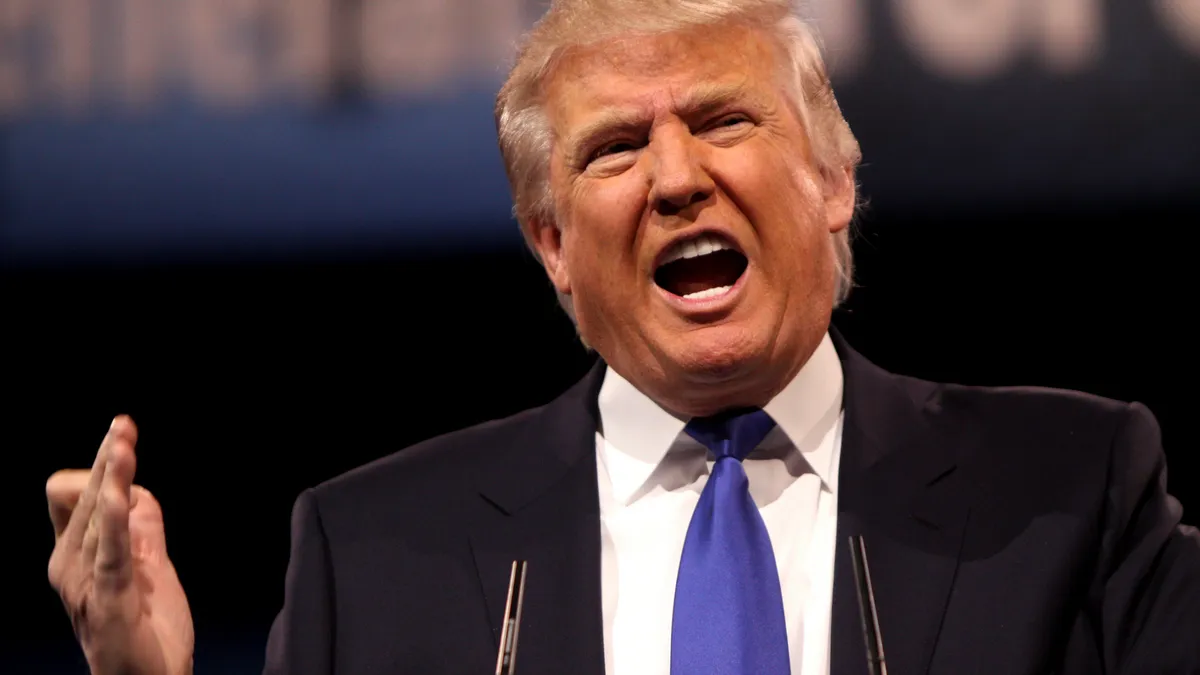Dive Brief:
- President Donald Trump will announce his decision on whether to pull the U.S. out of the Paris climate accord at 3 p.m. EST on Thursday. The event will be televised live from the White House.
- Trump is expected to announce he will exit the 2015 accord, but details on how remain unclear. The Paris withdrawal process could take until late 2020, but Trump could also opt for the quicker and more radical move of pulling out of the underlying treaty, the United Nations Framework Convention on Climate Change.
- The Paris accord aims to limit global warming to 2°C this century, translating into a roughly 80% economywide decarbonization for the U.S. by 2050. Most energy companies, including U.S. utilities and oil and gas majors, want the U.S. to remain in the accord.
Dive Insight:
The White House has delayed a final decision on the Paris accord multiple times, but Trump tweeted Wednesday night that the wait is about to end.
I will be announcing my decision on Paris Accord, Thursday at 3:00 P.M. The White House Rose Garden. MAKE AMERICA GREAT AGAIN!
— Donald J. Trump (@realDonaldTrump) May 31, 2017
Multiple news reports this week suggested Trump will pull the U.S. out of the accord, signed by 195 nations at the end of 2015. That would fulfill a high-profile campaign promise, but the White House is reportedly divided on the pact, fueling an intense debate among advisors seeking to influence the president's decision in recent weeks.
The final details of the decision are reportedly in flux even hours before the announcement. Unnamed sources told the New York Times and Axios that Wednesday was spent discussing the strategy for pulling out of the accord, but the president could yet change his mind.
Trump has a few strategies to choose from should he opt for the exit. The Paris accord includes a withdrawal process that would take until at least November 2020 to complete, and in that time, Trump could change his mind.
European leaders reportedly tried to impress on the president the difficulty the withdrawal process at a G7 meeting last week. Jean-Claude Juncker, president of the European Commission, told the AP that Trump does not "comprehensively understand" the agreement and that allies tried in vain to explain the withdrawal process "in clear, simple sentences."
“This notion, ‘I am Trump, I am American, America first and I am getting out,’ that is not going to happen," Juncker said.
Alternatively, the president could declare the accord a legal treaty, which would need Senate approval, or pull the U.S. out of the United Nations Framework Convention on Climate Change, the underlying treaty for the Paris accord — a more radical and controversial move.
For the power sector, withdrawal from the climate accord could signal less pressure for deep carbon cuts in the coming decades. Because the power sector is likely to play a key role in decarbonizing other sectors, GHG cuts for electricity generation would likely need to be even deeper than the economywide goal, approaching zero net carbon by 2050.
Without the Clean Power Plan, a domestic climate regulation Trump is expected to roll back, the U.S. will miss even short-term goals under the Paris commitment, a Rhodium Group report found this month. For that reason, many sector observers see the Paris accord as a target for future presidential administrations to use for emissions regulations.
Fearing that, 22 GOP senators wrote to the White House last week urging an exit from the accord, arguing green groups could use the pact as the legal foundation for lawsuits challenging the rollback of environmental regulations.
That letter helped influence Trump to ditch the accord, Axios reported, but the senators stressed the U.S. should not leave the underlying UNFCC treaty.
No matter the withdrawal strategy, an exit from the Paris accord would be met by intense criticism from the business community, international allies, and most of the energy sector. Former U.N. Ambassador Samantha Power embodied the dismay of many when she tweeted yesterday that a Paris exit would mean "the end of the American Century."
"To the degree the Trump Administration is already actively dismantling domestic climate policy at the federal level, withdrawing from Paris will have no effect on the policy landscape for U.S. utilities," Jesse Jenkins, an MIT energy researcher, wrote to Utility Dive. "What Paris gave us was a strong framework to bridge the collective action challenge and jointly work with other nations to ratchet up ambition on climate mitigation over time. President Trump is walking away from that opportunity."
Still, there are those who think the Paris accord will be better off without the U.S. Writing in Nature, Australian environmental professor Luke Kemp argues that allowing the U.S. to stay in the accord while gutting domestic climate protections would weaken the pact.













